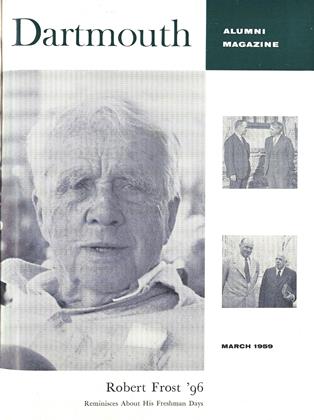Rendered into verse by StanwoodCobb '03. Washington: Avalon Press, 1958.75 pp. $2.00
With this recent publication, Mr. Cobb adds another volume to his numerous writings that reflect deep interest in Eastern literature and thought, a side-interest that began shortly after graduation from Dartmouth while Cobb was an instructor at Robert College on the Bosporus, and has since been enlarged by his personal contact with a remarkable Chinese acquaintance, Wu Ming Fu, self-exiled in Washington. Prominent among Cobb's previous studies are, in fact, three volumes of verse entitled The Wisdom of ..., Patterns in Jade of..., and The Way of Life 0f... this same Wu Ming Fu. Another of Cobb's studies previously reviewed in these columns was his rendering of the philosphy of Lao Tse.
In the introduction to the present volume, the writer explains his indebtedness to his friend Fu, who had left him literary executor of his unpublished manuscripts. Among the papers Cobb came on "rough and literal translation notes" that Fu had taken down from the love verse entitled "The Jade Necklace" by the little-known Lin San Kwei of the T'ang Dynasty. These quatrains reflect, Cobb believes, the famed love romance of Emperor Ming Huang (715-756 A.D.), whose idyllic reign of humane beauty remains unrivaled in Chinese history. In it, Chinese womanhood was free and glorified, and poetry and the arts were the indispensable brand of greatness on the throne and among its subjects. Underlying this verse was also the mystical love of nature, like Wordsworth's, that Buddhism had recently enshrined in Chinese minds and hearts.
To all this Mr. Cobb has undertaken the not-too-easy task of giving an English equivalent, including the original metrical scheme in pithy quatrains, such as Curtis Hidden Page and David Lambuth of our English department themselves Orientalists - used to delight in.
Most pleasing in Mr. Cobb's rendition are the seeming ease and the spontaneity with which he frees his lines of the stilted phrasing of the literal translator and so gives the verse a freshness and beauty for today. Our love-lorn can feel at one with their kind twelve centuries ago as they read:
You looked at me once, twice; yea, thrice!
Then prickly currents warm of love began To sweetly course throughout the body-nerves. Not like the mind, heart needs no words or plan.
 View Full Issue
View Full Issue
More From This Issue
-
 Feature
FeatureFRESHMAN DAYS...
March 1959 By EDWARD CONNERY LATHEM '51 -
 Feature
Feature"Spoiled Children" of Hanover: A Letter from Charles Doe, 1849
March 1959 By JOHN P. REID -
 Feature
FeatureSCHOOLMARMS, GRAMMARIANS and ANARCHISTS
March 1959 By ROBERT S. BURGER -
 Class Notes
Class Notes1918
March 1959 By THOMAS E. SHIRLEY, W. CURTIS GLOVER, RICHARD P. WHITE -
 Class Notes
Class Notes1950
March 1959 By SCOTT C. OLIN, SIMON J. MORAND III -
 Class Notes
Class Notes1926
March 1959 By ROBERT L. MAY, EDWARD J. HANLON, BRUCE W. EAKEN
E. BRADLEE WATSON '02
-
 Books
BooksFLETCHER, BEAUMONT & Cos.,
May 1947 By E. Bradlee Watson '02 -
 Article
ArticleThe Fifty-Year Address
July 1952 By E. BRADLEE WATSON '02 -
 Books
BooksSAGE OF THE SACRED MOUNTAIN.
March 1954 By E. BRADLEE WATSON '02 -
 Books
BooksTHE MAGNIFICENT PARTNERSHIP.
March 1955 By E. BRADLEE WATSON '02 -
 Class Notes
Class NotesThe 55th Reunion of 1902
July 1957 By E. BRADLEE WATSON '02
Books
-
 Books
BooksMemories and Anecdotes
January 1916 -
 Books
BooksTHE CRYSTAL YEARS
January 1953 By Eric P. Kelly '06 -
 Books
BooksPhiloprogenitive Bird
December 1975 By JOHN HURD '21 -
 Books
BooksMATHEMATICS IN MEDICINE AND THE LIFE SCIENCES.
OCTOBER 1966 By JOHN PHILIP HENRY, M.D. -
 Books
BooksSCHERZO FROM THE PROUD CITY
June 1933 By L. C. Flint -
 Books
BooksTHE JURISPRUDENCE OF JOHN MARSHALL.
MARCH 1969 By ROBERT L. LOEB '21

